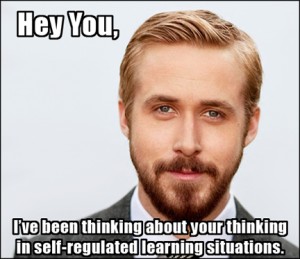By Michael J. Serra at Texas Tech University
This past Sunday, you might have watched “The 87th Academy Awards” (i.e., “The Oscars”) on television. Amongst the nominees for the major awards were several films based on true events and real-life people, including two films depicting key events in the lives of scientists Stephen Hawking (The Theory of Everything) and Alan Turing (The Imitation Game).
There are few things in life that I am sure of, but one thing I can personally guarantee is this: No film studio will ever make a motion picture about the life of your favorite metacognition researcher. Believe it or not, the newest issue of Entertainment Weekly does not feature leaked script details about an upcoming film chronicling how J. T. Hart came up with the idea to study people’s feelings of knowing (Hart, 1967), and British actors are not lining up to depict John Flavell laying down the foundational components for future theory and research on metacognition (Flavell, 1979). Much to my personal dismay, David Fincher hasn’t returned my calls regarding the screenplay I wrote about that time Thomas Nelson examined people’s judgments of learning at extreme altitudes on Mt. Everest (Nelson et al., 1990).
Just as film studios seem to lack interest in portraying metacognition research on the big screen, our own students sometimes seem uninterested in anything we might tell them about metacognition. Even the promise of improving their grades sometimes doesn’t seem to interest them! Why not?
One possibility, as I recently found out from a recent blog post by organic-chemistry professor and tutor “O-Chem Prof”, is that the term “metacognition” might simply not be sexy to our students (O-Chem Prof, 2015). He suggests that we instead refer to the concept as “sexing up your noodle”.
Although the idea of changing the name of my graduate course on the topic to “PSY 6969: Graduate Seminar in Sexing-up your Noodle” is highly tempting, I do not think that the problem is completely one of branding or advertising. Rather, regardless of what we call metacognition (or whether or not we even put a specific label on it for our students), there are other factors that we know play a crucial role in whether or not students will actually engage in self-regulated learning behaviors such as the metacognitive monitoring and control of their learning. Specifically, Pintrich and De Groot (1990; see Miltiadou & Savenye, 2003 for a review) identified three major factors that determine students’ motivation to learn that I suggest will also predict their willingness to engage in metacognition: value, expectancy, and affect.
The value component predicts that students will be more interested and motivated to learn about topics that they see value in learning. If they are struggling to learn a valued topic, they should be motivated to engage in metacognition to help improve their learning about it. A wealth of research demonstrates that students’ values and interest predict their motivation, learning, and self-regulation behaviors (e.g., Pintrich & De Groot, 1990; Pintrich et al., 1994; Wolters & Pintrich, 1998; for a review, see Schiefele, 1991). Therefore, when students do not seem to care about engaging in metacognition to improve their learning, it might not be that metacognition is not “sexy” to them; it might be that the topic itself (e.g., organic chemistry) is not sexy to them (sorry, O-Chem Prof!).
The expectancy component predicts that students will be more motivated to engage in self-regulated learning behaviors (e.g., metacognitive control) if they believe that their efforts will have positive outcomes (and won’t be motivated to do so if they believe their efforts will not have an effect). Some students (entity theorists) believe that they cannot change their intelligence through studying or practice, whereas other students (incremental theorists) believe that they can improve their intelligence (Dweck et al., 1995; see also Wolters & Pintrich, 1998). Further, entity theorists tend to rely on extrinsic motivation and to set performance-based goals, whereas incremental theorists tend to rely on intrinsic motivation and to set mastery-based goals. Compared to entity theorists, students who are incremental theorists earn higher grades and are more likely to persevere in the face of failure or underperformance (Duckworth & Eskreis-Winkler, 2013; Dweck & Leggett, 1988; Romero et al., 2014; see also Pintrich, 1999; Sungur, 2007). Fortunately, interventions have been successful at changing students to an incremental mindset, which in turn improves their learning outcomes (Aronson et al., 2002; Blackwell et al., 2007; Good et al., 2003; Hong et al., 1999).
The affective component predicts that students will be hampered by negative thoughts about learning or anxiety about exams (e.g., stereotype threat; test anxiety). Unfortunately, past research indicates that students who experience test anxiety will struggle to regulate their learning and ultimately end up performing poorly despite their efforts to study or to improve their learning (e.g., Bandura, 1986; Pintrich & De Groot, 1990; Pintrich & Schunk, 1996; Wolters & Pintrich, 1998). These students in particular might benefit from instruction on self-regulation or metacognition, as they seem to be motivated and interested to learn the topic at hand, but are too focused on their eventual test performance to study efficiently. At least some of this issue might be improved if students adopt a mastery mindset over a performance mindset, as increased learning (rather than high grades) becomes the ultimate goal. Further, adopting an incremental mindset over an entity mindset should reduce the influence of beliefs about lack of raw ability to learn a given topic.
In summary, although I acknowledge that metacognition might not be particularly “sexy” to our students, I do not think that is the reason our students often seem uninterested in engaging in metacognition to help them understand the topics in our courses or to perform better on our exams. If we want our students to care about their learning in our courses, we need to make sure that they feel the topic is important (i.e., that the topic itself is sexy), we need to provide them with effective self-regulation strategies or opportunities (e.g., elaborative interrogation, self-explanation, or interleaved practice questions; see Dunlosky et al., 2013) and help them feel confident enough to employ them, we need to work to reduce test anxiety at the individual and group/situation level, and we need to convince our students to adopt a mastery (incremental) mindset about learning. Then, perhaps, our students will find metacognition to be just as sexy as we think it is.
References
Aronson, J., Fried, C. B., & Good, C. (2002). Reducing the effects of stereotype threat on African American college students by shaping theories of intelligence. Journal of Experimental Social Psychology, 38, 113-125. doi:10.1006/jesp.2001.1491
Bandura, A. (1986). Social foundations of thought and action: A social cognitive theory. Englewood Cliffs, NJ: Prentice-Hall.
Blackwell, L. S., Trzesniewski, K. H., & Dweck, C. S. (2007). Implicit theories of intelligence predict achievement across an adolescent transition: A longitudinal study and an intervention. Child Development, 78, 246-263. doi: 10.1111/j.1467-8624.2007.00995.x
Duckworth, A., & Eskreis-Winkler, L. (2013). True Grit. Observer, 26. http://www.psychologicalscience.org/index.php/publications/observer/2013/april-13/true-grit.html
Dunlosky, J., Rawson, K. A., Marsh, E. J., Nathan, M. J., & Willingham, D. T. (2013). Improving students’ learning with effective learning techniques promising directions from cognitive and educational psychology. Psychological Science in the Public Interest, 14, 4-58. doi: 10.1177/1529100612453266
Dweck, C. S., Chiu, C. Y., & Hong, Y. Y. (1995). Implicit theories and their role in judgments and reactions: A world from two perspectives. Psychological Inquiry, 6, 267-285. doi: 10.1207/s15327965pli0604_1
Dweck, C. S., & Leggett, E. L. (1988). A social-cognitive approach to motivation and personality. Psychological Review, 95, 256-273. doi: 10.1037/0033-295X.95.2.256
Flavell, J. H. (1979). Metacognition and cognitive monitoring: A new area of cognitive-developmental inquiry. American Psychologist, 34, 906-911. doi: 10.1037/0003-066X.34.10.906
Good, C., Aronson, J., & Inzlicht, M. (2003). Improving adolescents’ standardized test performance: An intervention to reduce the effect of stereotype threat. Applied Developmental Psychology, 24, 645-662. doi: 10.1016/j.appdev.2003.09.002
Hart, J. T. (1967). Memory and the memory-monitoring process. Journal of Verbal Learning and Verbal Behavior, 6, 685-691. doi: 10.1016/S0022-5371(67)80072-0
Hong, Y., Chiu, C., Dweck, C. S., Lin, D., & Wan, W. (1999). Implicit theories, attributions, and coping: A meaning system approach. Journal of Personality and Social Psychology, 77, 588-599. doi: 10.1037/0022-3514.77.3.588
Miltiadou, M., & Savenye, W. C. (2003). Applying social cognitive constructs of motivation to enhance student success in online distance education. AACE Journal, 11, 78-95. http://www.editlib.org/p/17795/
Nelson, T. O., Dunlosky, J., White, D. M., Steinberg, J., Townes, B. D., & Anderson, D. (1990). Cognition and metacognition at extreme altitudes on Mount Everest. Journal of Experimental Psychology: General, 119, 367-374.
O-Chem Prof. (2015, Jan 7). Our Problem with Metacognition is Not Enough Sex. [Web log]. Retrieved from http://phd-organic-chemistry-tutor.com/our-problem-with-metacognition-not-enough-sex/
Pintrich, P. R. (1999). The role of motivation in promoting and sustaining self-regulated learning. International Journal of Educational Research, 31, 459-470. doi: 10.1016/S0883-0355(99)00015-4
Pintrich, P. R., & De Groot, E. V. (1990). Motivational and self-regulated learning components of classroom academic performance. Journal of Educational Psychology, 82, 33-40. doi: 10.1037/0022-0663.82.1.33
Pintrich, P. R., Roeser, R., & De Groot, E. V. (1994). Classroom and individual differences in early adolescents’ motivation and self-regulated learning. Journal of Early Adolescence, 14, 139-161. doi: 10.1177/027243169401400204
Pintrich, P. R., & Schunk D. H. (1996). Motivation in education: Theory, research, and applications. Englewood Cliffs, NJ: Merrill/Prentice Hall.
Romero, C., Master, A., Paunesku, D., Dweck, C. S., & Gross, J. J. (2014). Academic and emotional functioning in middle school: The role of implicit theories. Emotion, 14, 227-234. doi: 10.1037/a0035490
Schiefele, U. (1991). Interest, learning, and motivation. Educational Psychologist, 26, 299-323. doi: 10.1080/00461520.1991.9653136
Sungur, S. (2007). Modeling the relationships among students’ motivational beliefs, metacognitive strategy use, and effort regulation. Scandinavian Journal of Educational Research, 51, 315-326. doi: 10.1080/00313830701356166
Wolters, C. A., & Pintrich, P. R. (1998). Contextual differences in student motivation and self-regulated learning in mathematics, English, and social studies classrooms. Instructional Science, 26, 27-47. doi: 10.1023/A:1003035929216




